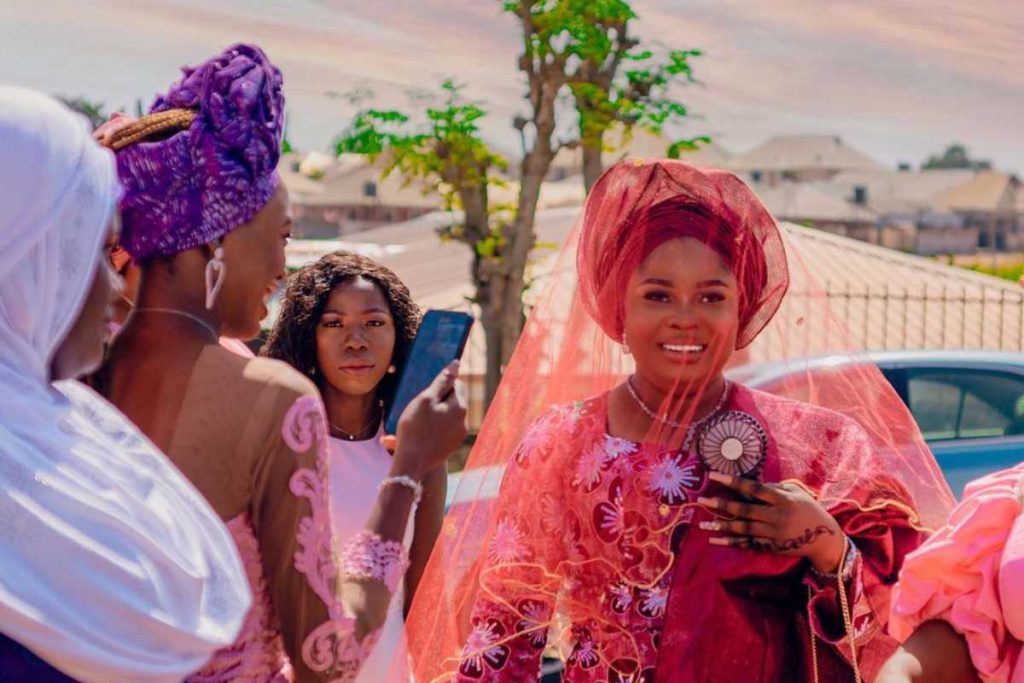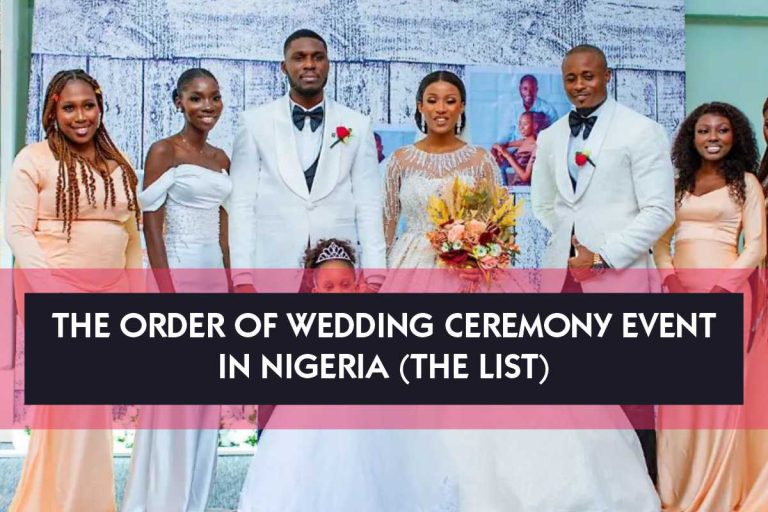Wedding ceremonies are an important cultural tradition in Nigeria, and understanding the order of events that take place during a traditional Nigerian wedding ceremony is essential for anyone participating in or attending one.
In Nigeria, wedding ceremonies are steeped in tradition and are a celebration of the union of two families. From the pre-wedding events to the actual ceremony and reception, each event has its own set of customs and traditions that are followed. Understanding these events and their significance is important for anyone looking to honor and respect Nigerian cultural traditions.
So, in this blog post, we will be taking a closer look at the order of events that take place during a traditional Nigerian wedding ceremony.
Table of Contents
ToggleThe Pre-wedding Events
Pre-wedding events in a traditional Nigerian wedding can vary depending on the culture and traditions of the couple and their families. Here are some common pre-wedding events that may take place:
- Engagement ceremony: This is a formal event where the couple’s families come together to announce their intention to marry. The groom’s family may present the bride’s family with gifts, such as money or items of value. The couple may also exchange rings as a symbol of their commitment. In some cultures, the groom may also be required to perform certain tasks or pay a dowry to the bride’s family as part of the engagement process.
- Traditional wedding attire fittings: The bride and groom may visit a tailor to have their traditional wedding attire fitted and made. This can include traditional outfits such as the Aso-Ebi (uniform fabric worn by the wedding party) and the bride’s wedding gown.
- Bridal shower: This is a party hosted by the bride’s friends and family to celebrate her upcoming marriage. It may include games, gift-giving, and other activities.
- Bachelor/bachelorette party: This is a party for the bride and groom to celebrate with their friends before the wedding. It may include activities such as a night out on the town or a weekend getaway.
- Pre-wedding photoshoot: The couple may have professional photographs taken before the wedding to use in their wedding album or for social media. These photographs may include traditional elements such as the couple’s traditional wedding attire or cultural symbols.
- Traditional wedding rehearsal: The couple may participate in a traditional wedding rehearsal to practice the customs and traditions that will be followed on the day of the wedding. This may include the exchange of marriage vows and the breaking of kola nuts which is a traditional West African ritual symbolizing the couple’s unity and commitment to each other.
Overall, these pre-wedding events are an important part of the traditional Nigerian wedding experience, and they provide an opportunity for the couple and their families to come together and celebrate their love and commitment to each other.
The Order Of Wedding Ceremony Event Itself

The traditional order of events during a Nigerian wedding ceremony can vary slightly depending on the specific cultural traditions and personal preferences of the couple. However, there are several events that are typically included in the ceremony. Here is a general outline of the order of events:
1) Introduction of the Couple:
In a traditional Nigerian wedding ceremony, the introduction of the couple typically takes place at the beginning of the ceremony. This is the moment when the bride and groom are formally welcomed and introduced to the ceremony by the officiant or a designated emcee.
During the introduction, the names of the couple are announced and they may be presented to the wedding guests. This is typically a brief event that sets the stage for the rest of the ceremony. It is a way to formally introduce the couple to the ceremony and to officially begin the celebration of their union.
2) The Wedding Processional:
The processional is the part of the wedding ceremony in which the wedding party and the bride and groom enter the ceremony space and take their places. This typically includes the groom and his groomsmen entering first, followed by the bride and her bridal party.
Want To Print Something?
In a traditional Nigerian wedding ceremony, the groom and his groomsmen may enter the ceremony space to the sound of traditional music or drums. The bride and her bridal party may also enter to music, often accompanied by the father of the bride or a designated escort.
The processional is typically led by the officiant or an emcee, who may introduce the wedding party and the couple as they enter. The processional is an important part of the ceremony as it marks the beginning of the formal wedding ceremony and sets the tone for the rest of the event.
The order in which the wedding party enters the ceremony space is typically determined by the couple and their wedding planner or coordinator. The bride and groom may choose to have their wedding party enter in a specific order, such as the bridal party entering first followed by the groomsmen, or they may choose to have everyone enter at the same time. The order of the processional can be customized to fit the couple’s preferences and the overall theme and style of the wedding.
3) Opening prayers:
The ceremony often begins with a prayer as with every religious Nigerian, opening prayers are always included in almost every one of our events, and our wedding ceremonies are not left out. These prayers may be led by a spiritual leader or family member and are typically intended to seek blessings and guidance for the couple as they begin their marriage. The opening prayers may be a traditional religious prayer or a more general blessing.
During the opening prayers, the couple, wedding party, and guests may be asked to bow their heads in respect or to join in the prayer. The opening prayers may also include a reading of a passage from a religious text or a song or hymn. The purpose of the opening prayers is to set a spiritual tone for the ceremony and to ask for blessings and guidance for the couple as they start their new life together.
4) Exchange of Marriage Vows:
The exchange of marriage vows is a key event during a wedding ceremony, in which the bride and groom pledge their commitment and love to each other in front of their family and friends. This typically involves each partner making a statement expressing their love and commitment to the other and may include traditional vows or personal vows written by the couple.
During the exchange of vows, the couple faces each other and holds hands, with the officiant standing between them. The bride and groom may also choose to have a symbolic gesture, such as lighting a unity candle or tying a knot, to symbolize their union.
The exchange of vows is an important moment in the wedding ceremony as it marks the official start of the couple’s marriage and establishes their commitment to each other. It is typically a heartfelt and emotional moment for both the bride and groom, as well as for their loved ones who are witnesses to their vows.
5) Exchange of Rings:
During every wedding ceremony in Nigeria, the bride and groom exchange rings as a symbol of their eternal commitment to each other. The rings are typically placed on the fourth finger of the left hand, as it was once believed that this finger had a direct connection to the heart.
The exchange of rings usually takes place after the exchange of marriage vows and before the declaration of marriage. The couple may choose to exchange their own vows or use traditional vows as part of the ring exchange. The rings are typically placed on the finger by the spouse, and the couple may choose to hold hands or hold the rings during the exchange.
Want To Print Something?
This particular event is an important part of the wedding ceremony as it signifies the couple’s commitment to each other and their intention to spend the rest of their lives together. It is a moment that is often marked with emotion and significance, and the rings serve as a constant reminder of the couple’s love and commitment to each other.
6) Traditional Elements or Rituals:
Depending on the couple’s cultural traditions, there may be additional elements or rituals incorporated into the ceremony. These elements and rituals can vary depending on the couple’s specific cultural traditions and personal preferences. Here are a few examples of traditional elements and rituals that may be included in a Nigerian wedding ceremony:
- Breaking of kola nuts: In many Nigerian cultures, the breaking of kola nuts is a traditional ritual that symbolizes the joining of two families. The kola nuts are usually presented to the couple by the bride’s family and are then broken by the couple, with each person taking a piece to symbolize their commitment to the union.
- Bride price: In some Nigerian cultures, the groom is required to pay a bride price, also known as a dowry, to the bride’s family as a symbol of his commitment to the marriage and his willingness to support his new wife. The bride’s price may be paid in the form of money, property, or other valuable items.
- Igba Nkwu wine carrying: In some Nigerian cultures, the Igba Nkwu ceremony is an important traditional ritual that takes place during the wedding ceremony. During this ritual, the bride and groom each carry a calabash of wine, known as an Igba Nkwu, and offer it to their respective families as a symbol of unity.
- Presentation of yams: In some Nigerian cultures, the presentation of yams is an important traditional element of the wedding ceremony. The yams, which are a symbol of prosperity and fertility, are usually presented to the couple by the bride’s family as a blessing for their new life together.
- Presentation of other traditional gifts: Depending on the couple’s cultural traditions, they may also exchange or be presented with other traditional gifts, such as traditional wedding attire, jewelry, or household items.
These are just a few examples of the traditional elements and rituals that may be included in a Nigerian wedding ceremony. The specific elements and rituals that are included can vary greatly depending on the couple’s cultural traditions and personal preferences.
7) Declaration of Marriage:
This is typically the point in the ceremony at which the couple is officially pronounced husband and wife.
The declaration of marriage is typically made by the officiant, who is the person conducting the ceremony. This may be a religious leader, such as a pastor or imam, or a secular officiant, such as a judge or justice of the peace. The officiant will typically ask the couple to repeat after them a set of vows or affirmations, declaring their commitment to each other and their intention to enter into marriage.
Once the vows or affirmations have been exchanged and the couple has exchanged rings, the officiant will declare the couple to be married. This is usually done by saying something along the lines of “I now pronounce you husband and wife.” At this point, the couple is considered to be legally married and can consider themselves husband and wife.
The declaration of marriage is also one of the significant moments in the wedding ceremony, as it marks the official beginning of the couple’s marriage. It is often accompanied by cheers and applause from the guests, and the couple may exchange a kiss or embrace to celebrate the occasion.
8) Closing Prayers:
In the same way, we start most of our events with prayer in Nigeria, we also end them with prayers and blessings. This part of the event is typically a brief prayer or blessing offered at the end of the ceremony to give thanks for the union of the couple and to ask for God’s blessings on their marriage.
The closing prayers can be led by a spiritual leader, such as a pastor or imam, or by a family member or close friend who has been asked to officiate the ceremony. The prayer is often a brief and simple expression of thanks and well-wishes for the couple and may include a request for guidance, strength, and love as they embark on their new life together.
In some cases, the closing prayers may also include a blessing or wish for the couple’s future children, or a prayer for the couple’s families to come together in love and support. Closing prayers are an important and symbolic way to bring the ceremony to a close and to set the tone for the couple’s new life together.
Want To Print Something?
9) The Wedding Recessional:
The last part of the wedding ceremony program is the wedding recessional, which is the process of the wedding party and the newlyweds exiting the ceremony space. The recessional typically occurs immediately after the declaration of marriage and the closing prayers.
During the recessional, the wedding party and the newlyweds typically walk down the aisle together, with the bride and groom leading the way. The processional is often accompanied by music and is a joyous and celebratory moment in the ceremony.
The recessional marks the end of the formal wedding ceremony and the beginning of the reception, which is typically a time for the newlyweds and their guests to celebrate and enjoy food, music, and dancing. The recessional is an important part of the traditional order of events in a Nigerian wedding ceremony, as it signifies the official union of the bride and groom and marks the start of their new life together.
In Conclusion
In summary, the traditional order of events in a Nigerian wedding ceremony includes various pre-wedding events, followed by the actual wedding ceremony which includes traditional elements and cultural rituals. The reception usually follows the wedding ceremony where everyone parties and dances. It is important to understand and respect the cultural significance of these events in a Nigerian wedding ceremony, as they are steeped in tradition and hold great meaning for the couple and their families.
Overall, the order of events in a Nigerian wedding ceremony is a rich and meaningful celebration of love and commitment, and it is important to approach it with understanding and respect.




